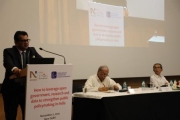Around 100 participants from a diverse group of researchers, policymakers, civil society, representatives of international organizations and corporate sector attended this seminar co-hosted by NCAER and 3ie. The event was held in the new Conference Centre offering world-class facilities at NCAER. Participants working on development economics, impact evaluation, for the government and the technology sector discussed on a variety of topics on how to leverage open government, data and research to strengthen public policymaking in India.
Advocates of open government believe that civil society and researchers should have access to all government data and analysis. The argument goes that having this information will allow researchers to produce and validate evidence for policymaking, and will allow the public to be better informed. Policymakers will, in turn, be more apt to listen to a better-informed public. Under what conditions does such a virtuous circle operate best, and what are key entry points to jump start such a circle? Central to this case of seamless information flows is the role now of social media, big data, AI, and machine learning. This brings into play concerns about privacy, ethics, inclusion and sovereignty, crucial issues for development practitioners and evaluators to explore. How can the accountability of the underlying evidence and of policymaking itself be best served in a fast-moving digital world? The proceedings of the seminar brought offered suggestions on many such challenges.
Shekhar Shah, NCAER and Emmanuel Jimenez, 3ie delivered remarks at the opening of the seminar. The first session explored the conditions under which there is a virtuous circle of open government and data that leads to good evidence and to good policymaking that further reinforces the openness of data and government. The panelists were Avani Kapur, Accountability Initiative, Parth Shah, Centre for Civil Society, Rahul Matthan, Trlegal and was the session was chaired by Dr Shah. In the second session, discussions focused on how the digital world is transforming the generation and transmission of evidence and how its speed should be leveraged to enhance sound policymaking without some of its collateral costs. It was chaired by Marie Gaarder, 3ie and the panelists were Aparna Krishnan, J-Pal SA, C N Raghupati, Infosys and Renuka Sane, NIPFP.
In his Keynote address, Amitabh Kant, Niti Ayog stressed on the need to setup a national open data and analytics platform that can stitch together datasets of government departments. “Data has to be made available for researchers, academicians and young start-ups to work on. Without data there can be no governance, no transformation, and no on-ground changes”, he said.
Co-hosted by NCAER, this seminar was a part of 3ie’s 2019 Delhi Evidence Week, Beyond good intentions: from action to impact. 3ie supports the generation and effective use of high-quality evidence to inform decision-making and improve the lives of people living in poverty in low- and middle-income countries. It provides guidance and support to produce, synthesise and assure the quality of evidence of what works, for whom, how, why and at what cost.
NCAER has served the nation well with its rich offering of applied policy research, unique economic and social data sets, evaluations, and policy inputs for over 60 years. NCAER’s work covers the entire spectrum of public policy, from macroeconomics to poverty. NCAER researchers generate and analyse empirical evidence to support and inform public policy choices in these areas. NCAER is one of a handful of think-tanks globally that combine rigorous analysis and policy outreach with deep, scientific field data collection capabilities.










